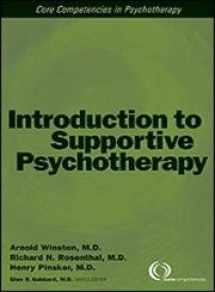
Introduction to Supportive Psychotherapy: Core Competencies in Psychotherapy (Core Competency in Psychotherapy)
Book details
Summary
Description
Supportive psychotherapy-the most widely practiced form of individual psychotherapy today-draws on a depth and breadth of skills to exercise the discipline effectively. Recognizing the importance of this therapy to the field, the Psychiatry Residency Review Committee of the Accreditation Council for Graduate Medical Education (ACGME) mandated that competence in supportive psychotherapy is required of all psychiatry residents.
One of five volumes in the groundbreaking Core Competencies in Psychotherapy series, this remarkable clinical guide will be a trusted resource for how to do supportive psychotherapy. Extensively detailed clinical vignettes are woven into each aspect of supportive psychotherapy discussed in this concise yet comprehensive work.
In nine informative chapters, the authors cover the basic principles of supportive psychotherapy, clarifying the placement of supportive psychotherapy in a continuum of supportive to expressive psychotherapy that corresponds with the extent and level of a patient's psychopathology. They detail the general framework of supportive psychotherapy, including indications, phases of treatment, beginning and ending sessions, professional boundaries, therapeutic relationship issues (e.g., transference, countertransference, therapeutic alliance), and self-disclosure guidelines.
More specifically, the authors discuss four major areas:
- • Establishing and maintaining a positive therapeutic alliance• Understanding and formulating patients' problems (i.e., how to perform a thorough patient evaluation and case formulation)• Setting realistic treatment goals with patients, helping them maintain or reestablish their best possible level of functioning given the limitations of their personality, native ability, and life circumstances• Knowing what to say to patients (i.e., practical techniques that can be used right away)
The authors also present evidence for the efficacy of supportive psychotherapy, with a summary of a number of outcome trials. In concluding chapters, they discuss crisis intervention, special populations (e.g., patients with chronic mental illness and comorbid conditions), and the criteria used to determine competency in this field.
Although intended primarily for beginning therapists who need to learn the fundamentals of psychotherapy and in particular, how to talk with psychotherapy patients, this practical work-complete with index and references-will be immediately useful among a much wider audience: students in introductory courses in psychotherapy, supportive psychotherapy, treatment planning, and medicine; psychiatry residents who need to demonstrate competency in this form of psychotherapy; and seasoned practitioners in psychiatry, psychology, social work, occupational and recreational therapy, and medicine.


We would LOVE it if you could help us and other readers by reviewing the book
Book review



